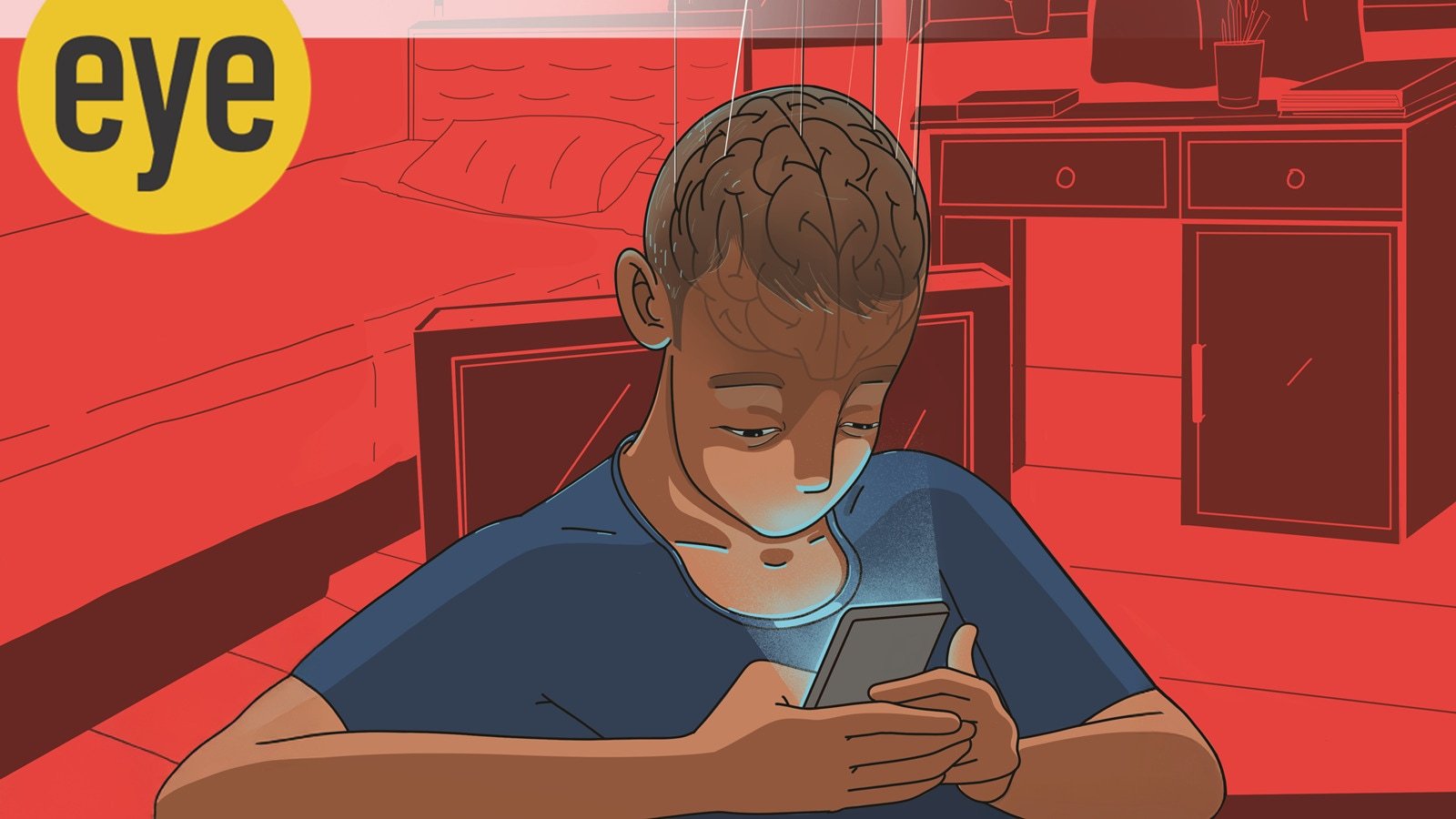
Student, 16: Aren’t you worried that I could break into your file system that you protect with your password, steal your records? For two years, the cops couldn’t catch me. This time a silly error got me here. But I have sent fake bomb threats over email to at least 25 to 30 schools. The internet is my playground. I can own it anytime I want.
Student: Just alright! I could hack into your wi-fi, phone, bank accounts you know.
Dolly: No. Not much in the account anyway. But why do you enjoy scaring people? (Handing him a Rubik’s cube).
Student: Because nobody sees me.
Dolly: I am seeing you now, the boy who can dare the internet. So why did you send fake bomb threats to schools?
Student: Because I hate the school system, exams and marks. I hate taking tests because I don’t write them well, score low. Yet everybody, my parents even, talk to me only about my scores… to them my rank is the only achievement. They don’t care about me. They don’t understand that I can do other things. Now they are here because I took down the school system itself with one email. That’s power, not marks. Now, are you scared or do you still like me as a child? Would you want to see me again?
This boy is no Jamie from the Netflix series Adolescence, though this conversation seems eerily close to a scene from it. Dolly has been witness to many such sessions with misunderstood and maladjusted teens in her line of work.
“This 16-year-old was from a privileged south Delhi background, his parents lavishing him with comfort and the latest devices, the latest gaming laptop and iPhone 16 ProMax. They thought their child was a nerd, who had no interest in mainstream education, and would hardly look at what he was doing with his devices. But they would push him on test scores, saying only that would guarantee him an entry to a good college and scholarship. Rather than working on his exam phobia, they unwittingly pushed him to it,” she says.
Story continues below this ad
That’s why the 16-year-old would email bomb threats to schools before exams or before a parent-teacher meeting, disrupting the system to draw attention to his alternative vision of looking at the world. Isolated, this introvert found hacking to be his tool for rebellion. He signed up for online tutorials on the dark web, which require specialised software and configurations, such as the Tor browser, to access. This allows users to hide their identity and location from others and law enforcement. “He told me that although his physicality would be unseen, the world would see his work. And when you get drawn into the seeming permissiveness of communication in the dark web, you do not realise when an impressionable teen can fall for every negative emotion as a form of self-defence. So there is no sense of guilt at all,” says Dolly.
This is the foundation of toxic masculinity, where young people with low self-worth find a community of like-minded but anonymous people in chatrooms on the dark web. They are indoctrinated and radicalised to develop a beehive mentality and justify their hitback crimes and aggression as a rite of passage into manhood, and, by extension, control. They have free access to extreme physical and sexual violence carried out by other young people and indulge in copycat behaviour in their real lives. “Social media, influencers and peer loyalties are propagating extreme ideologies among young minds. There’s a reason why this happens. The pre-frontal cortex of the human brain — the one that’s responsible for decision-making, reasoning, impulse control and self-expression — keeps developing in boys till they turn 20. Till then their emotions guide them. Besides, their growth hormones kick in, making them prone to aggression, especially when their peer dominance is questioned,” says Urvashi Musale, child and teen behavioural psychologist and founder of Proparent, Mumbai. For British influencers like Andrew Tate, who are now demigods of subversion, the ideology is just about building an online constituency and clicks they can monetise. Teen boys are just lamb to the slaughter. Welcome to the manosphere!
 A scene from Adolescence: Jamie and his counsellor
A scene from Adolescence: Jamie and his counsellor
‘That girl made me do it’
Musale describes a case where a 14-year-old boy, initially docile, became a bully after becoming frustrated with his crush not acknowledging him. He started bullying her online, using hate speech and slut-shaming tactics to get her attention. “He said she always talks to boys with better looks and cars. ‘I am average and my parents aren’t rich. I’m not the boy every girl likes but I have become the boy everyone hates.’ That insecurity had turned him into the school bully,” she says.
Story continues below this ad
His behaviour was exacerbated by the messaging he found on social media, where influencers provided negative validation for his insecurity. This led the boy down a path of radicalisation and misdirected anger towards women, a pattern often seen in communities like incels (involuntary celibates), who believe women are responsible for their social rejection. “Frustrated by their lack of sexual experiences, they believe that women are to blame as they use their sexual privilege to reject men at whim. For example, he got toxic advisories like ‘Don’t open the door for a girl, they don’t deserve it,’ or ‘If you are rude to them, they will come after you,’ ” says Musale, who worked with the boy’s parents first before addressing his condition.
Musale worked with them to improve communication. They avoided labelling the sessions as “counselling” to reduce stigma, focussing instead on building trust and connection. Applying reverse psychology, the boy’s mother told him she needed expert help to understand him better and resolve conflicts. Days later, the boy opened up to his mother, asking her if she would sing with him. She was taken aback by her son’s hidden talent. He told her, “You never knew I sing or what my favourite songs are.” Now they share playlists with each other and do an impromptu jam over the weekend.
“Bullying is a cry from your child that they are stuck somewhere, seeking validation from their closest. So find that vacuum,” urges Musale. The boy’s parents now try to make it home half-an-hour earlier than before, his father shares story links from social media with him and alerts him about its economy, including how influencers make money by pushing negative emotions and polarities that do not exist in the real world. “Without mentioning manosphere in conversations, he listed the pros and cons of following any idol or handle. He said how he signed up for many communities himself but had unfollowed them because they were more destructive than engaging. That got the boy to question the content makers of the posts he was following and he began discussing them with his father. As the family talked and shared their lives more, the influencer hold on his psyche diminished,” says Musale, who believes family engagement works in 90 per cent of cases in weaning teen boys away from influencers. Parents tend to judge everything from their own upbringing without realising they are no longer the sole influencers in their children’s lives and that they can be completely deranged as they feed on nonsensical things. “Instead of censoring, just get into their world of content, neutralise triggers,” adds Musale.
She also talks about preparing girls who often fall prey to boys radicalised in the manosphere. One of her patients, a 14-year-old girl, fell prey online to a 19-year-old boy, who raped her. “She was a victim of ‘grooming’, when older boys convince younger girls that they are ready to have a relationship, wear down their boundaries, sexually exploit them, share their sensitive information and trap them. She was so smitten that she sent him nude pictures and let him into the house when her parents were away. Yet the boy had just used her to make his girlfriend, a classmate at his college, jealous,” says the counsellor.
‘I didn’t do it, believe me’
Story continues below this ad
Dolly’s toughest case involved a group of teenage boys from a south Delhi school who sexually assaulted a girl student in a car, away from the cameras installed in the campus, but denied the act when confronted. “The medical evidence said otherwise, the video footage showed them entering the car but all they said was that they were trying to ‘help’ the girl with water and juices as she had fainted in the heat. They were not guilty about crossing the line but worried their detention would affect their approval among peers and be interpreted as being weak,” she says. Also, a lot of lying comes from their understanding that juveniles can never be prosecuted for crimes the same way as adults. But the provocation for extreme behaviour, for both privileged and other kids, is their unfiltered access to social media, pornography and peer pressure. “It’s almost like a dare, you see something, you enact it, you experiment and challenge your friends to do it to absolve your sense of regret. In one of the sexual offence cases, one of my 15-year-old suspects admitted, ‘Humne ganda kaam kiya hai, par maine akele kuch nahin kiya (I have done something wrong, but I didn’t do it alone).’ His friends had challenged his masculinity and he didn’t want to look meek,” says Dolly.
One of her success stories has been of a 15-year-old who did petty thefts for drug money. “The first three sessions he tested me, asking me to recall his case details. I did that to build trust. Then he bragged about his immense fan following on Instagram, ranting how the world was anti-man. Listening to him without judgment or opinion, he gradually admitted to his isolation and his mother’s dismissal of him as a good-for-nothing. But ranting on Instagram had helped him monetise his likes, so he kept spouting views he didn’t believe in. He chose drugs to escape the fog in his mind,” says Dolly. Noticing him doodling, the therapist asked him to sketch something. She made him draw for three sessions. “At the end of it, he came to the sessions voluntarily and even signed up for art classes,” she adds.
Copycat Syndrome
The influence of aggressive male role models is particularly dangerous when young boys are raised in an environment that reinforces gender norms and traditional power structures. “Even in modern nuclear structures, the man gets the best seat at the table and is seen as the decision-maker. The social media content just validates these implicit codes. And because we expect boys to toughen up, this unspoken rule of manning up means that they cannot verbalise their emotions. But they have to come out at some point. That’s why they resort to violence. This, too, they emulate from news videos,” says Dr Alisha Laljee, Mumbai-based psychologist and school educator.
Self-worth benchmarks are very poor for young boys. Which is why a simple “no” from a girl can seem like societal rejection. “A boy who destroyed a girl’s reputation in school told me in our session, ‘I asked her out on a date. She could have met me, seen how the date went and then rejected me. Why did she dismiss me in front of my friends?’ That’s how fragile his ego was,” she says.
Story continues below this ad
Then there’s the cult of “looksmaxxing,” a trending advisory that helps young boys “maximise” their appearance and look like Greek gods to get social acceptance. Looksmaxxing may appear harmless, encouraging self-care, exercise and healthy eating. But then it degenerates into a body obsession so severe that teens get into steroid use, hair transplants, plastic surgery for removing ribs, a sculpted waist and lengthening limbs for extra height in extreme cases. “Some resort to self-harm measures like ‘bone-smashing’ where they hit their jaws with blunt objects to re-shape them, assuming bones adapt to stresses. I am seeing many young boys with body scars. Out of 10 boys, eight will take pictures of self-injury and share them in online communities as proof of bravado,” says Dr Laljee.
Dismantle this echo chamber
Extreme ideologies and misconceptions proliferate easily online because everybody feels secure in an echo chamber instead of taking care of their social skill deficits. Dr Mimansa Tanwar, clinical psychologist at Fortis Healthcare, is working on a module of teen-parent communication. “Parents today need to have conversations beyond academia and ask boys about their social and cultural life. They do not know how to navigate the challenges of the digital world and need help processing and filtering these influences. While teachers take care of primarily academics, this is a gap that parents need to fill,” she says.
She even suggests that parents and teachers get a crash course in media literacy themselves to help young people understand that social media is all about creating a perception, a peer-driven sameness, rather than celebrating one’s individuality. “That’s why there have to be daily conversations at home on everything, from news to Taylor Swift. Children learn from healthy relationships in a physical environment faster than they do on a tablet,” says Dr Tanwar.





